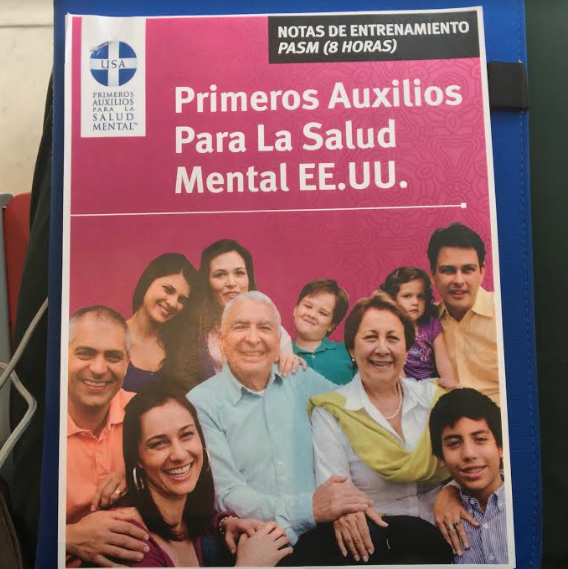And hello. Welcome to another round of Mental Health Monday, your weekly dose of stories, resources, and motivation for your everyday life. Last week, there was a candid interview with Kelly Rowland about losing her mom a few weeks after her son was born, a story about grief's effect on mental illness, one perspective on what can happen when military veterans struggling with PTSD become police officers, and much mo'. Check it out.
Also last week: Alex hopped on Facebook Live to talk about the Mental Health First Aid instructor's course he recently completed, our Mental Health Monday content and other upcoming goodness, and his upcoming mental health awareness event at the Schomburg Center in Harlem. Here is part one and here is part two.
THIS WEEK'S GOODNESS:
Entrepreneur Sangu Delle knows firsthand the toll ignoring your mental wellness can take on your body and your life. In the above talk, the TED Fellow opened up about how he overcome shame, came to his senses and got serious about his mental and emotional health.
"Naomi Campbell Speaks On Being Shamed for Seeking Drug Abuse Help" by Yakira Young [BET]
"People tried to shame me about the fact that I went to get help. You should never feel shame because recovery is a positive thing. But when I first went, people were not open about this stuff."
"How to Stay Sane if Trump is Driving You Insane: Advice From a Therapist" by Robin Chancer [Medium]
"Acknowledge that greed and racism are part of our nation’s fabric. We cannot wish them away. We cannot choose blindness disguised as positive bias; giving Republican politicians the “benefit of the doubt” has allowed them to get away with murder. Expect to find white rage in any discussion about immigration or discrimination, for example. Anticipating it will help us stay calm and focused. Once we accept that, we sharpen our focus to guard against their insidious infections. We focus on the work of fighting for human rights and accountability."
"Negative Emotions Are Key to Well-Being" by Tori Rodriguez [Scientific American]
"A crucial goal of therapy is to learn to acknowledge and express a full range of emotions, and here was a client apologizing for doing just that. In my psychotherapy practice, many of my clients struggle with highly distressing emotions, such as extreme anger, or with suicidal thoughts. In recent years I have noticed an increase in the number of people who also feel guilty or ashamed about what they perceive to be negativity. Such reactions undoubtedly stem from our culture's overriding bias toward positive thinking. Although positive emotions are worth cultivating, problems arise when people start believing they must be upbeat all the time."
"VICELAND premieres The Therapist" [Shadow and Act]
In the series, Dr. Siri will conduct therapeutic sessions with celebrities in the field of rap, rock, pop, dancehall and EDM. Celebrities in season one of "The Therapist" will be Hip Hop Artists Freddie Gibbs, Waka Flocka Flame, Young M.A., Dej Loaf, D.R.A.M., O.T. Genasis, and rapper/actor Joey Bada$$; also rock musicians Corey Taylor of Slipknot, Wavves’ Nathan Williams, and Damien Abraham will join the roster.
"5 Supplements to Take For Mental Health" by Erin Magner [Well and Good]
"In her practice, Dr. Bergman—who relies on a mix of Eastern and Western medicine—routinely starts off by checking patients’ nutrient levels, because even super healthy eaters can have serious deficiencies. (That’s partly because “bioavailability,” i.e., the body’s ability to absorb nutrients, is a surprisingly complex thing.)
The good news? Once patients start supplementing strategically, most deficiencies can be corrected in a matter of months, Dr. Bergman says—even days. "
"How do you safely depict self-harm, suicide and mental health problems in the mainstream media?" by Oliver Lunn [VICE]
"It's a hot-button issue, the depiction of depression, self-harm and -- most importantly -- suicide. Last year we asked the question, can you direct depression on screen? It's tricky, in short, with more questions than answers. How does the mainstream media depict mental health? What's a responsible depiction? What's an irresponsible depiction? How do people who struggle with these things -- the most important people in this debate -- view such depictions? And what sort of impact can the depictions have on them?"
"A New Approach To Helping Men Of Color Heal After A Violent Incident" by Nick Chiles [NPR]
"Kirby said when his team is working with young men, the discussions often revolve around the question of how they define masculinity, which can get in the way of the healing process.
"Think about the messages they're getting from a young age. When you're learning how to walk and you fall, and you look like you're going to cry, most likely you hear from the people around you, 'Boy, don't cry. Get up, don't cry,'" Kirby said."
"Suicides Prompt Medical Schools to Finally Address Student Mental Health" by David Gorn [KQED]
"A Keck student, 25-year-old Sean Petro, had failed to show up for a clinical rotation. Eventually, campus police found his body in a closet of his apartment, where he had hung himself. In addition to attending medical school, Petro had just become an officer in the Navy Reserve, and had hopes of becoming a flight surgeon.
At Keck, he was just one year shy of graduating."
Are you a Black mental health professional? Do you know one? Alex is building a hub for Black wellness. Learn how you can be down.
Do you have a mental health-related story, video, event, or other content we should know about? Hit us up.










